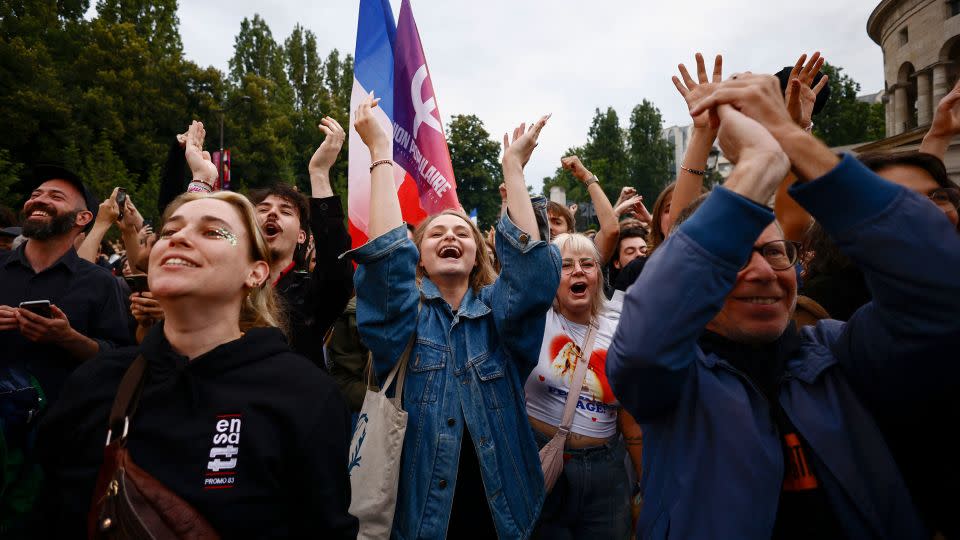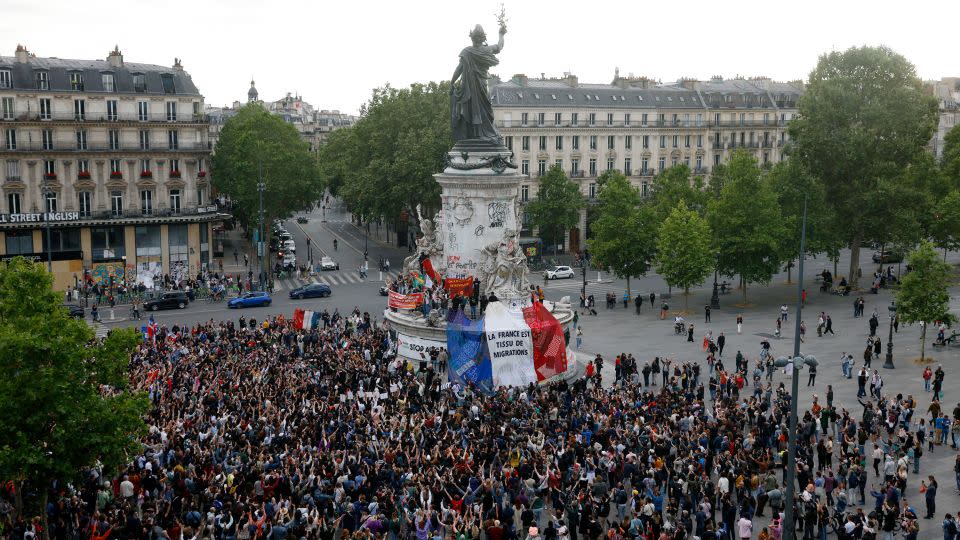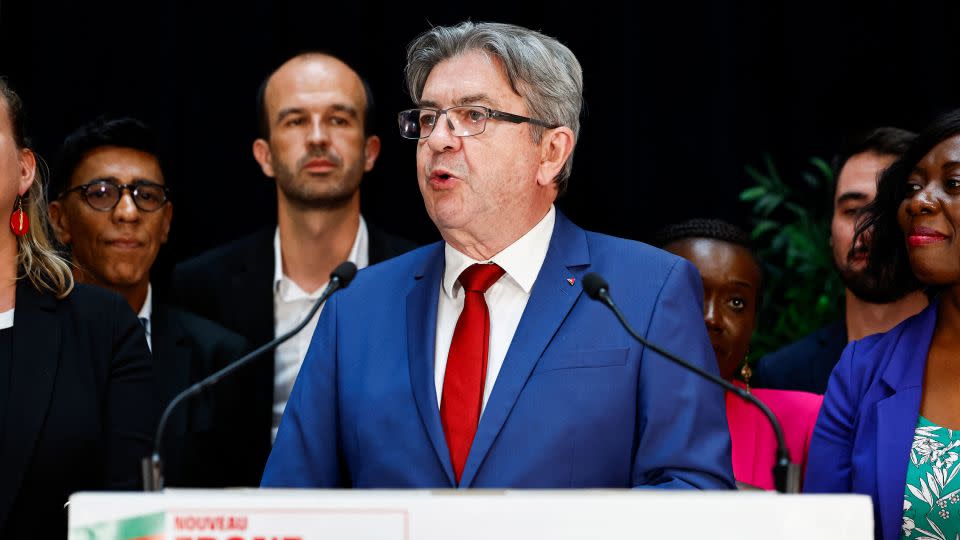Leftist surge foils far right but French election ends in deadlock
- Oops!Something went wrong.Please try again later.
- Oops!Something went wrong.Please try again later.
- Oops!Something went wrong.Please try again later.
A left-wing alliance has won the most seats in the French parliament after tactical voting in Sunday’s second round election thwarted Marine Le Pen’s far-right party, but France will be left in political limbo after no party came close to winning an absolute majority.
In a surprise result, the New Popular Front (NFP) – a cluster of several parties ranging from the far-left France Unbowed party to the more moderate Socialists and the Ecologists – won 182 seats in the National Assembly, making it the largest group but short of the 289 required for an absolute majority, according to the French Interior Ministry.
President Emmanuel Macron’s centrist Ensemble alliance, which had slumped to a dismal third in the first round of voting last Sunday, mounted a strong recovery to win 163 seats. Despite leading after the first round of votes, Marine Le Pen’s far-right National Rally (RN) party and its allies won 143 seats.
The RN’s strong showing in the first round stirred fears that France could be on the cusp of electing its first far-right government since the collaborationist Vichy regime of World War II. But Sunday’s results come as a huge upset and show French voters’ overwhelming desire to keep the far right from gaining power – even at the cost of a hung parliament.
After the first round, an unprecedented number of seats – over 300 – went to a three-way runoff between Ensemble, the NFP and the RN. By Tuesday, more than 200 centrist and left-wing candidates withdrew from the second round, in a bid to avoid splitting the vote.
Cheers rang out on the streets of Paris as the projection was published. Speaking to a crowd of his ecstatic supporters near Stalingrad square, Jean-Luc Mélenchon, the firebrand leader of France Unbowed, said the results came as a “huge relief for the overwhelming majority of people in our country.”
“Our people have clearly rejected the worst-case scenario,” Mélenchon said. “A magnificent surge of civic mobilization has taken hold!”
Gabriel Attal, Macron’s protege, announced he would resign as prime minister Monday morning. He seemed to take a swipe at Macron’s decision to call the snap vote, saying he “didn’t choose” for France’s parliament to be dissolved.
Elsewhere in Paris, the buoyant atmosphere at a RN campaign event in Bois de Vincennes took a nosedive an hour before the polls closed. After the projection was announced, Jordan Bardella, the party’s 28-year-old leader, said France had been thrown into “uncertainty and instability.”
Handpicked as leader by Marine Le Pen in an effort to purge the party of its racist and antisemitic roots, Bardella had taken the party closer to the gates of power than ever before. Visibly disappointed by the results, he slammed the NFP as an “alliance of dishonor.”
“As from tomorrow, our deputies will take up their places to make sure we counter the migration policies and other policies of the far left. We will not enter into any kind of coalition or compromise, we will be the side of the French people,” he said.

A hastily assembled coalition
In a brief statement, the Elysee said Macron is awaiting the full results of all 577 constituencies “before taking the necessary decisions.”
“In his role as guarantor of our institutions, the president will ensure that the sovereign choice of the French people is respected,” it said.
After parliamentary elections, the French president appoints a prime minister from the party that won the most seats. Ordinarily, this means a candidate from the president’s own party. However, Sunday’s results mean Macron faces the prospect of having to appoint a figure from the left-wing coalition, in a rare arrangement known as a “cohabitation.”
Speaking to supporters near Stalingrad square, Mélenchon said Macron “has the duty to call the New Popular Front to govern.”

But it is not clear from which party within the coalition that Macron will appoint a prime minister. France Unbowed won 74 seats, making it the largest single party within the NFP, ahead of the Socialists with 59.
But Macron and his allies had repeatedly stressed that they would refuse to enter into coalition with Mélenchon. Speaking after last Sunday’s first round, outgoing Prime Minister Gabriel Attal – Macron’s protege, said France Unbowed was preventing the formation of a “credible alternative” to the far right.
The NFP formed less than a month ago, after Macron called the snap vote following his party’s disastrous loss to the RN in last month’s European Parliament election.
The capacious – and potentially fractious – coalition chose its name in an attempt to resurrect the original Popular Front that blocked the far right from gaining power in 1936. Sunday’s results mean the NFP has managed to do this again.
It campaigned on a platform to raise the minimum monthly wage to 1,600 euros (more than $1,700), to cap the price of essential foods, electricity, fuel and gas, and to scrap Macron’s deeply unpopular pension reform, which raised the French retirement age – already one of the lowest in the Western world – from 62 to 64.

A mess of Macron’s making?
Sunday’s vote represents a victory for the French “cordon sanitaire,” the principle that mainstream parties must unite to block the far right from taking office.
But the RN’s success should not be underestimated. In the 2017 elections, when Macron swept to power, the RN won just eight seats. In 2022, it surged to 89 seats. In Sunday’s vote, it won 125 – making it the largest individual party in parliament.
While the risk of a far-right government has been avoided for now, these elections have plunged France into political uncertainty. Macron called the election three years earlier than necessary, just minutes after his party was trounced by the far right in the EU election.
Although EU election results need have no bearing on domestic politics, Macron said he could not ignore the message sent to him by voters and wanted to clarify the situation.
But Sunday’s results may further muddy the French political picture. Unable to call a new election for at least another year, and with three years left on his presidential term, Macron looks set to preside over an unruly parliament, as problems mount at home and abroad.
Édouard Philippe, France’s former prime minister and an ally of Macron, said Macron’s gamble had further complicated the situation.
“The truth is that none of the political blocs in the assembly has a majority on its own to govern. The dissolution of the assembly, which was intended as a clarification, has instead led to great vagueness,” he said Sunday evening.
“The central political forces therefore have a responsibility to stay. They must, without compromise, promote the creation of an agreement that will stabilize the political situation.”
CNN’s Joseph Ataman and Melissa Bell contributed reporting.
For more CNN news and newsletters create an account at CNN.com

